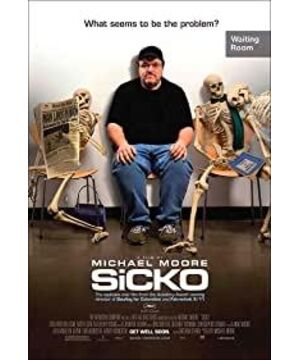There are many words in it that have been changed. The reason is unknown, and the specific changes are made. Unknown, I will send it out first.
-------------------------------------------------- --------
"You have to manage when you are sick"
----------------------------------- ---------------------------
Under the market system, whoever cares is the American leftist pacemaker Mike Moore recently released a new documentary " "Sicko" criticizes the market-oriented medical service system in the United States and praises the European-style universal publicly funded medical system. It is said that when the film was shown in various parts of the United States, it won a standing applause from many viewers.
Americans have reason to like this movie. According to statistics, there are currently 46 million people (about 15% of the population) in the United States without medical insurance.
Many people with medical insurance are also always "matching wits and courage" with insurance companies, because insurance companies are always looking for excuses not to pay patients' medical expenses. "Sicko" expresses the tragic experience of patients in the network of interests woven by insurance companies, politicians, and hospitals through the tearful talk of the parties.
In order to show the superiority of free medical care for all, Moore went to Europe and Canada. The European and Canadian people interviewed were very cooperative and said: We don’t pay for medical treatment, and we don’t pay for medicine... Oh yeah! In the UK, the poor can be reimbursed for travel expenses to the hospital; while a French woman has just given birth, the government even sends people to her home to wash and cook!
What is even more frustrating for Americans is that although the United States does not implement universal public medical care, its medical expenditure accounts for a larger proportion of government expenditures than most developed countries (the United States 18.5%, Canada 16.7%, and France 14.2%), and the average life expectancy is also higher than other countries. Developed countries should be short (77 in the United States, 79 in the United Kingdom, and 80 in Canada). In short, the United States has spent more money on medical services, but achieved fewer things.
Where is the problem?
In fact, the US medical service system is not entirely market-oriented. The government is the biggest payer of medical services. The medical insurance and medical assistance programs that subsidize the poor and the elderly cover 27% of the population, accounting for about 44% of the total medical expenditure in the United States (insurers pay about 36%, and individuals pay about 15%) . However, in terms of population ratio, the medical insurance for most of the US population is market-oriented. Generally speaking, individuals and their employers (generally employers pay the bulk) buy medical insurance from an insurance company, and the insurance company pays for medical expenses if they fall ill. In other words, in Europe, the government is sandwiched between the patient and the hospital, while in the United States, the insurance company is sandwiched between the patient and the hospital. It is this difference that has become the problem: on the one hand, insurance companies seek to increase medical costs for profit; on the other hand, although insurance companies mostly care about their payment coverage, within the ironclad medical coverage, it is easy to cause people to "excessively" Seek medical attention" to further increase medical expenses.
Since private insurance companies seem to be the "source of all evil", why not just abolish them? The explanation of the leftist "angry youth" Moore is simple: American politicians have bought insurance and pharmaceutical companies.
It may not be that simple.
Coincidentally, corresponding to Moore's "Sicko" is a documentary short film "Dead Meat" that reflects the problems of Canada's publicly funded medical system. Also through the complaints of the parties, it conveys the opposite message: the publicly funded medical system is inefficient and inhumane. Due to the limited public medical resources, Canada has a phenomenon of "long lines" for treatment. Sometimes minor illnesses become serious illnesses, and serious illnesses wait until death. According to statistics, the average waiting time for Canadians to see specialists in 2005 was 17.7 weeks, and only half of the patients could be treated in time. Some Canadians complained: In this country, a dog usually only needs to wait a week for an operation, while a person who wants to have an operation may wait a year or two.
A similar situation exists in Europe. In the UK, nearly 1 million Britons are waiting in line for medical services; officials also admit that one-eighth of the population needs to wait more than a year before undergoing surgery. As for France, which Moore loves, the medical sector has already borne 2.7 billion US dollars in debt. In fact, just as Moore sang the praises of publicly funded healthcare for all, Europe and Canada had already begun the process of healthcare reform.
It can be seen that things are not black and white as Moore described: it is difficult to have both efficiency and fairness between market-oriented medical insurance and public medical care. Moreover, in a politically clean country, letting the government manage medical resources may also ensure that everyone "queues" fairly, while in a corrupt country, the phenomenon of "jumping in the queue" of the powerful and influential is almost inevitable. In this case, the whole people Free medical care is likely to be inefficient and unfair.
And strictly speaking, the so-called free medical care is not really free, and its cost is high taxes. With the aging of the population, the cost of diagnosis and treatment technology and drug research and development is getting higher and higher, will the cost of the free medical system one day be so high that the tax system is distorted?
God knows. It is estimated that medical expenses now account for 16% of the US GDP, but by 2030, it will account for 30%, and by the end of this century, it may even account for half. No wonder some scholars say that the biggest test of capitalism in the 21st century comes from the field of medical services.
So, what about the "third way" that mixes the two elements? In fact, the United Kingdom, Canada, etc. are experimenting with this system, trying to expand private practice in addition to publicly funded medical care. However, political resistance is not small, because the opening of any market "opening" may cause the loss of excellent doctors from the public three-dimensional system to the private three-dimensional system. In this way, it will affect the fair distribution of medical resources.
On the other hand, some states in the United States have begun to explore another "third way": to implement universal medical care on the basis of a market-oriented medical system. After the failure of Clinton's universal free medical reform in 1994, in recent years, the US state-level government has begun to carry the banner of reform. However, unlike the European system, these state governments are trying to find universal medical care that is compatible with the market. For example, they force employers of companies with more than 10 employees to buy insurance for their employees, and require citizens with conditions to purchase medical insurance, otherwise they will impose state tax refunds. In short, we will achieve universal medical insurance through balanced pressure on hospitals, insurance companies, employers, and citizens. In April 2006, Massachusetts became the first state to pass the "universal health insurance", and California, Vermont, Hawaii, etc. are also exploring the way.
Whether or not we agree with Moore's solution to the problem, we cannot disagree with his care. Regarding medical services as a basic human right is a beautiful pursuit, but on the other hand, we have to face the reality of shortage of medical resources. Whether it is dragged to death by the insurance company or in a long queue, it must be uncomfortable. Now we can only hope that the human ability to innovate systems will enable more and more people to circumvent this unfortunate multiple-choice question.
View more about Sicko reviews











